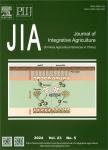Effect of heat shock on the susceptibility of Frankliniella occidentalis(Thysanoptera:Thripidae) to insecticides
Effect of heat shock on the susceptibility of Frankliniella occidentalis(Thysanoptera:Thripidae) to insecticides作者机构:Key Laboratory of Integrated Crop Pest Management of Shandong College of Agronomy and Plant Protection Qingdao Agricultural University Qingdao 266109 P.R. China Key Laboratory for Biology of Plant Diseases and Insect Pests Institute of Plant Protection Chinese Academy of Agricultural Sciences Beijing 100193 P.R.China Institute for the Control of Agrochemicals of Shandong Province Jinan 250100 P.R. China
出 版 物:《Journal of Integrative Agriculture》 (农业科学学报(英文版))
年 卷 期:2016年第15卷第10期
页 面:2309-2318页
核心收录:
学科分类:09[农学] 090402[农学-农业昆虫与害虫防治] 0710[理学-生物学] 0832[工学-食品科学与工程(可授工学、农学学位)] 0830[工学-环境科学与工程(可授工学、理学、农学学位)] 1004[医学-公共卫生与预防医学(可授医学、理学学位)] 0905[农学-畜牧学] 0906[农学-兽医学] 0904[农学-植物保护] 0901[农学-作物学] 0703[理学-化学] 0902[农学-园艺学] 0713[理学-生态学]
基 金:funded by the National Natural Science Foundation of China (31372003) the Shandong Modern Agricultural Technology and Industry System, China (SDAIT-02-021-11) the Taishan Scholarship Construction Engineering Special Fund, China the Startup Fund for Distinguished Scholars (631316) supported by the Qingdao Agricultural University,China
主 题:F rankliniella occidentalis heat shock susceptibility detoxification enzymes insecticide
摘 要:Currently, insecticides are considered as the primary approach for controlling western flower thrips, Frankliniella occidentalis(Pergande)(Thysanoptera: Thripidae). However, the heavy use of insecticides resulted in high insect resistance and serious environmental pollution. Given its characteristics of ease of operation and environmental friendliness, insect control using high temperature is receiving considerable renewed research interest. However, although the combination of insecticides and high temperature to control F. occidentalis has been studied before, few studies have focused on the short-term effect of such treatment. In a laboratory study, F. occidentalis adults and second-instar nymphs were exposed to 45℃ for 2 h. Then, their susceptibility to acetamiprid, spinosad, methomyl, and beta-cypermethrin was tested after different periods of recovery time(2–36 h). Additionally, the specific activity of three detoxification enzymes(esterase, glutathione S-transferase, and cytochrome p450(CYP) monooxygenase) of the treated insects was determined. The results indicated that the fluctuation of susceptibility to insecticides and detoxification enzyme activity during F. occidentalis recovery from heat shock are related. Furthermore, several recovery time points(2, 30, and 36 h) of significant susceptibility to four tested insecticides compared with the control were found during the treatment of adults that were heat-shocked. Recovery time points of higher susceptibility compared with the control depended on different insecticides during the second-instar nymph recovery from heat shock. Interestingly, the fluctuation of CYP monooxygenase activity exhibited a trend that was similar to the fluctuation of susceptibility to insecticides(especially spinosad) during the recovery from heat shock of adults. In addition, the glutathione S-transferase and CYP monooxygenase activity trend was similar to the trend of susceptibility to spinosad during the recovery from heat shoc



